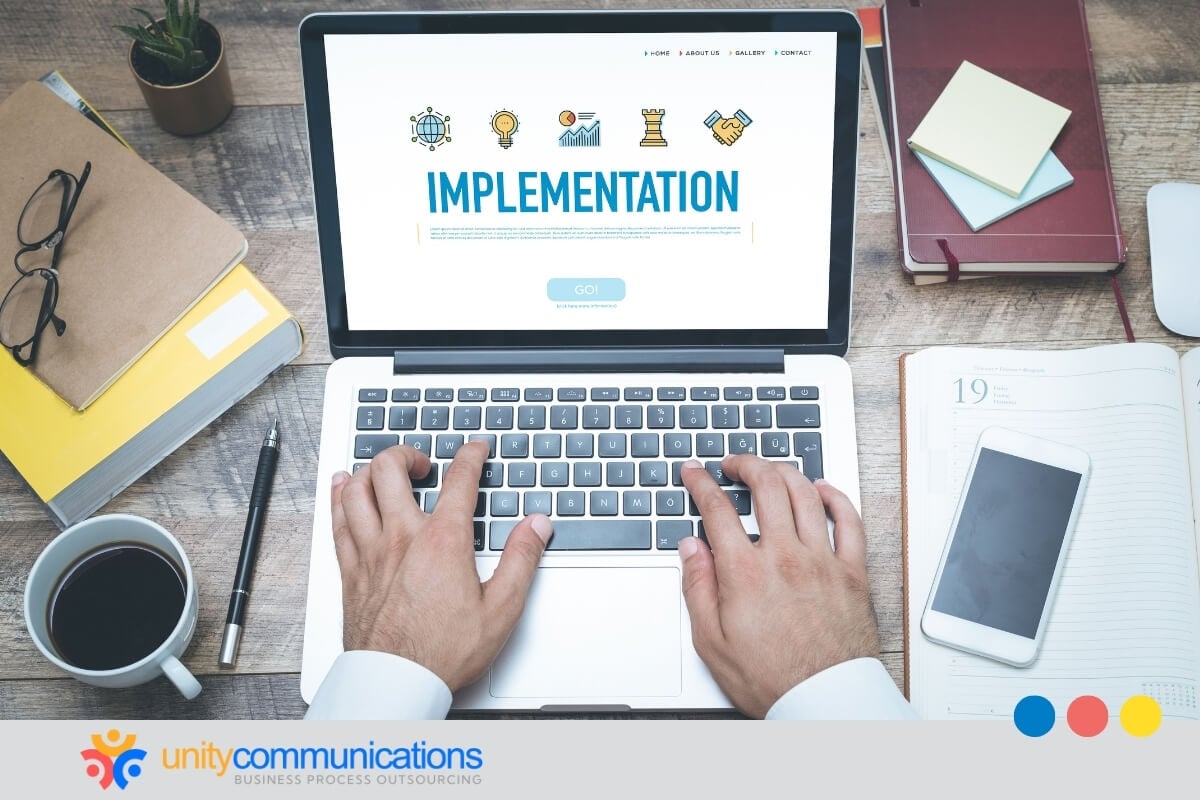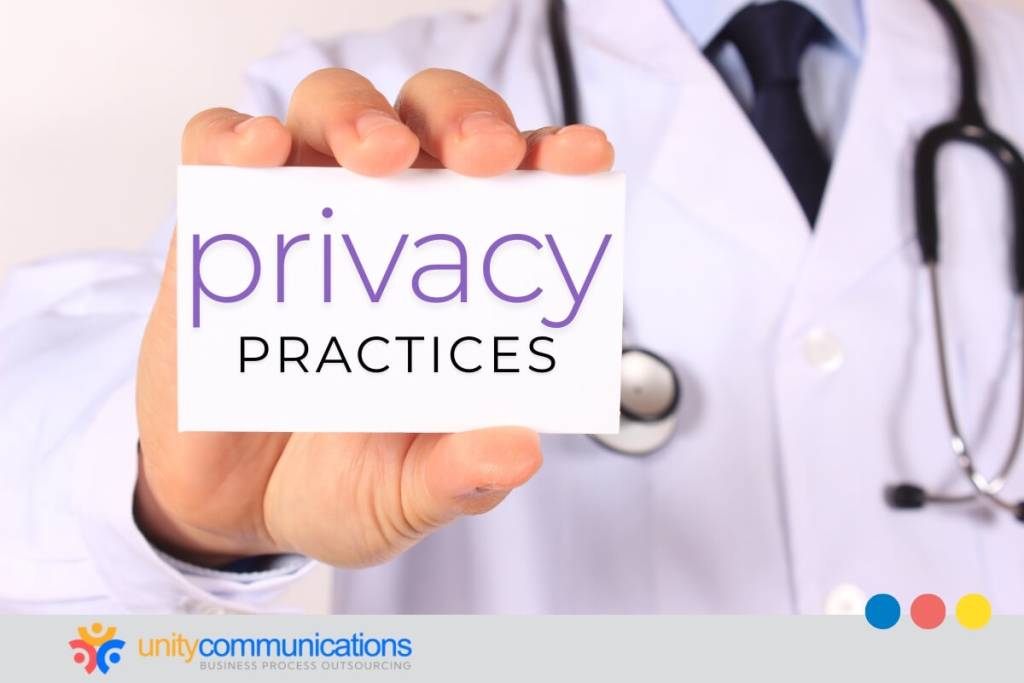IN THIS ARTICLE
Table of Contents
Healthcare providers must prioritize patient privacy and security to maintain trust and safeguard sensitive information from unauthorized access and misuse. This approach maintains compliance with complex, ever-changing industry regulations.
A virtual medical assistant (VMA) helps streamline workflows, enhance patient communication, and improve operational efficiency in healthcare practices. However, healthcare providers must protect information and uphold privacy because they access and process patient data when delivering support.
Read on to learn essential privacy practices you can implement for your virtual medical assistants.
The role of virtual medical assistants in healthcare

Virtual medical assistants are essential in the healthcare industry as they provide comprehensive back- and front-end support. Healthcare practitioners can then focus on critical activities such as patient consultations and treatments.
Most VMAs work in business process outsourcing (BPO) companies. Contracting a third party to manage non-core functions is what BPO is all about. Healthcare tasks to outsource include appointment scheduling, patient communication, and billing and invoicing.
How outsourcing works is the BPO provider deploys virtual medical assistants to handle such activities on behalf of the healthcare organization.
However, when leveraging BPO in telemedicine and healthcare, you rely on remote professionals to handle sensitive patient information. How do you guarantee they manage data with strict confidentiality and adherence to regulations?
The following privacy practices for virtual medical assistants can help:
Understanding HIPAA compliance
The Health Insurance Portability and Accountability Act of 1996 (HIPAA) establishes standards for safeguarding sensitive patient information. Understanding HIPAA is necessary for ensuring virtual medical assistants’ compliance, as it governs how they handle, share, and secure medical data. Furthermore, adherence to HIPAA regulations helps maintain patient trust.
Here are privacy practices for virtual medical assistants per HIPAA regulations:
- Provide regular training. Healthcare companies and BPO partners must provide ongoing education on HIPAA guidelines and data protection best practices to VMAs.
- Create secure communication channels. VMAs must use encrypted methods when sharing patient information to prevent unauthorized access.
- Follow access controls. Establish strict access controls to limit data access to authorized personnel only.
- Practice data encryption. Healthcare providers and BPO partners must guarantee VMAs practice sensitive medical data encryption in transit and at rest to safeguard against breaches.
- Maintain audit trails. VMAs must maintain detailed records of data access and modifications for accountability and traceability.
Choosing the right virtual assistant is necessary in this context. Engaging VMAs with updated HIPAA knowledge and a strong commitment to patient privacy helps your healthcare practice maintain compliance and safeguard sensitive data.
Implementing robust data security measures

Outsourcing administrative tasks in healthcare to virtual medical assistants means processing patient data externally. This process poses security risks, such as unauthorized access to patient records and data breaches from cyberattacks.
Avoid these issues with robust data security measures that VMAs must follow completely. Leverage or integrate established protocols of healthcare BPO services into your infrastructure for improved protection and compliance.
Below are other privacy practices for virtual medical assistants to uphold data confidentiality and maintain patient trust:
- Employ secure channels and protocols to transmit patient information safely.
- Utilize encrypted and secure storage systems for all patient data.
- Implement virtual private networks (VPNs) to protect data while accessing or transmitting information remotely.
- Use up-to-date anti-virus software and firewalls to safeguard against malware and cyber threats.
- Regularly update software and systems to address vulnerabilities and prevent exploitation.
- Conduct frequent security audits and vulnerability assessments to identify and address potential weaknesses in the data protection framework.
- Train staff on best practices for data security and phishing prevention to minimize the risk of human error leading to data breaches.
Suppose a clinic plans to hire a virtual assistant for its Phoenix healthcare operations. The clinic must consider the threat of cyberattacks in the area and implement stringent security protocols that the VMA must follow to protect patient data.
Organizing regular training and awareness programs
Training programs help virtual medical assistants stay current with privacy regulations and security threats. Ongoing education helps them recognize potential breaches and follow proper protocols for reporting and responding to security incidents.
The following are examples of security and privacy training and awareness programs you can implement for your VMAs:
- HIPAA compliance training. VMAs learn the essentials of HIPAA regulations and how to apply them in daily tasks.
- Data privacy and security workshops. These focus on best practices for handling and protecting sensitive patient information.
- Incident response training. VMAs learn protocols for responding to and reporting security breaches.
- Phishing awareness courses. These help VMAs identify and avoid phishing scams and other social engineering attacks.
- Encryption and secure communication training. These guide VMAs on using encryption tools and safe methods for data transmission.
Auditing and monitoring for compliance

Periodic audits and continuous monitoring of VMA performance promote adherence to policies and procedures for safeguarding patient information. Regular checks of privacy practices for virtual medical assistants help identify and address any gaps before they result in security risks.
Organizations can maintain high levels of data security and compliance by implementing a robust auditing and monitoring system, particularly in the healthcare process in BPO.
Implement the following strategies for effective VMA auditing and monitoring:
- Conduct scheduled audits to review VMAs’ adherence to privacy policies and identify non-compliance areas.
- Utilize software that provides real-time tracking of VMAs’ activities and data access to promptly detect suspicious behavior.
- Periodically review and adjust user access levels to provide VMAs with the appropriate permissions for their roles.
- Implement a system to log and analyze privacy incidents or potential breaches for timely investigation and corrective actions.
- Establish channels for VMAs to report concerns or suggest improvements to privacy practices, fostering a proactive compliance culture.
The bottom line
Applying privacy practices for virtual medical assistants is vital to fulfilling legal obligations and maintaining patient trust. Safeguarding patient information against breaches demonstrates a commitment to confidentiality and high-quality care.
Prioritize implementing these best practices in your healthcare operations as a fundamental aspect of your dedication to patient care and security. Start enhancing your privacy protocols for VMAs today to achieve the highest standard of service. Let’s connect to learn more.





